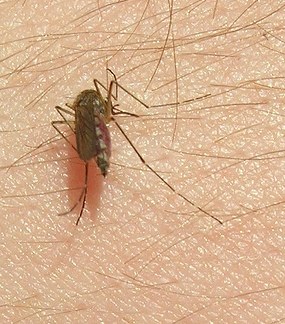 Self-professed cyberpunk Jonty Campbell sent me a link to a site reporting that the Brazilian adventure-travel magazine, Go Outside, has collaborated with Sao Paulo radio station, Band FM, to broadcast a music program that suppoedly repels mosquitoes. The radio station purportedly broadcasts a continuous tone at 15 kilohertz, which the site says is “inaudible to humans”, but “repels mosquitoes because it mimics the sound of dragonflies – a natural predator of mosquitoes”.
Self-professed cyberpunk Jonty Campbell sent me a link to a site reporting that the Brazilian adventure-travel magazine, Go Outside, has collaborated with Sao Paulo radio station, Band FM, to broadcast a music program that suppoedly repels mosquitoes. The radio station purportedly broadcasts a continuous tone at 15 kilohertz, which the site says is “inaudible to humans”, but “repels mosquitoes because it mimics the sound of dragonflies – a natural predator of mosquitoes”.
Well, I wasn’t convinced. For a start a lot of people can hear frequencies from around 20 Hz to 20 kHz. I can certainly hear 15 kHz on my laptop speakers when I do the test provided here. And, while I cannot hear 16 or 17 kHz, I can just hear a really, really high and quiet tone at 18 kHz. It would explain why our neighbour’s ultrasonic cat scarer was always so annoying (it generates a swirling tone at somewhere around 15 kHz. The older you get the narrower your hearing’s frequency response.
Anyway, I suspect somewhere, two things have been confused. The first is that about 10 years ago, a manufacturer started offering shopkeepers and town councils a device that was meant to scare off errant teenagers, youthful wannabe vandals, young shoplifters and under-age hoodies, by generating an annoying, high-pitched sound that respectable middle-aged people wouldn’t be able to hear but that would be unbearable to the youths. The device was known as a mosquito (presumably because the sound was akin to the high-pitched whining of the flying, biting insects).
There are smart phone apps that generate such high-pitched tones and errant teenagers on public transport use them to annoy middle-aged passengers whose hearing hasn’t quite gone yet. There are also so-called mosquito repellant apps for Android and iPhone that generate similarly high-pitched tones to scare away mosquitoes as well as standalone gadgets. I presume that back in Brazil, this is what that radio station is hoping to do. But, it all sounds very fishy…
A report on the Rutgers website by Wayne J. Crans, Associate Research Professor in Entomology, points out that the rationale for these anti-mosquito devices and apps is that:
“…repels females who have already mated and do not wish to be mated a second time. Others claim to mimic the sound of a hungry dragonfly, causing mosquitoes to flee the area to avoid becoming the predator’s next meal. Most of the electronic repellers on the market hum on a single frequency.”
They do not work. There is no scientific evidence that mosquitoes are repelled by high-frequency sounds at all. Moreover, dragonflies do not emit such high sounds their flapping wings almost buzz…that’s at most likely to generate a sound around the 50-250 Hz range. Indeed, a National University of Taiwan study pins the dragonfly wing beat fundamental at 170 Hz. That’s almost 100 times lower a frequency than the claimed anti-mosquito tone.
Moreover, according to Crans: “Mated female mosquitoes do not flee from amorous males, and mosquitoes do not vacate an area hunted by dragonflies.” The Brazilian radio show, if it really does broadcast evening-time anti-mosquito tones has been duped, or is simply trying to boost the tourist trade by somehow showing willing that the mossie problem is being addressed.
Seemingly, a whole fraudulent industry has been created that is as effective at repelling mosquitoes as homeopathy is at preventing tourists from catching malaria. In other words, it’s most certainly not effective! It’s scurrilous that such devices and apps, some of which are rather expensive, are being touted as protection against the mosquito which carries such a deadly disease.
I strongly suspect that the idea emerged from the anti-teenager technology known as The Mosquito, which teenagers have now turned on those who are anti them through annoying, high pitched phone apps. Anyway, that’s enough whining for today.
Mosquito photo by Dan McKay